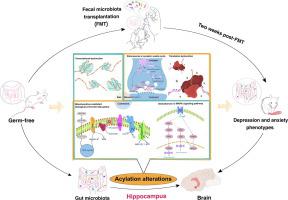Journal of Advanced Research ( IF 11.4 ) Pub Date : 2020-12-07 , DOI: 10.1016/j.jare.2020.12.002 Lanxiang Liu 1, 2, 3 , Haiyang Wang 2, 4 , Xuechen Rao 2, 5 , Ying Yu 2 , Wenxia Li 2 , Peng Zheng 2, 3 , Libo Zhao 1 , Chanjuan Zhou 2 , Juncai Pu 2, 3 , Deyu Yang 1 , Liang Fang 1 , Ping Ji 4, 6 , Jinlin Song 4, 6 , Hong Wei 7 , Peng Xie 1, 2, 3, 4

|
Introduction
Major depressive disorder is caused by gene–environment interactions, and the host microbiome has been recognized as an important environmental factor. However, the underlying mechanisms of the host–microbiota interactions that lead to depression are complex and remain poorly understood.
Objectives
The present study aimed to explore the possible mechanisms underlying gut microbiota dysbiosis-induced depressive-like behaviors.
Methods
We used high-performance liquid chromatography-tandem mass spectrometry to analyze alterations in the hippocampal lysine acetylome and succinylome in male mice that had received gut microbiota from fecal samples of either patients with major depressive disorder or healthy controls. This was followed by bioinformatic analyses.
Results
A total of 315 acetylation sites on 223 proteins and 624 succinylation sites on 494 proteins were differentially expressed in the gut microbiota-dysbiosis mice. The significantly acetylated proteins were primarily associated with carbon metabolism disruption and gene transcription suppression, while the synaptic vesicle cycle and protein translation were the most significantly altered functions for succinylated proteins. Additionally, our findings suggest that gut microbiota dysbiosis disturbs mitochondria-mediated biological processes and the MAPK signaling pathway through crosstalk between acetylation and succinylation on relevant proteins.
Conclusions
This is the first study to demonstrate modifications in acetylation and succinylation in gut microbiota-dysbiosis mice. Our findings provide new avenues for exploring the pathogenesis of gut microbiota dysbiosis-related depression, and highlight potential targets for depression treatment.
中文翻译:

肠道菌群失调小鼠海马赖氨酸乙酰基组和琥珀酰组的综合分析
介绍
重度抑郁症是由基因-环境相互作用引起的,宿主微生物组已被公认为重要的环境因素。然而,导致抑郁症的宿主-微生物群相互作用的潜在机制很复杂,并且仍然知之甚少。
目标
本研究旨在探索肠道微生物群失调引起的抑郁样行为的可能机制。
方法
我们使用高效液相色谱-串联质谱法分析了从重度抑郁症患者或健康对照的粪便样本中接受肠道微生物群的雄性小鼠海马赖氨酸乙酰基组和琥珀酰组的变化。随后进行了生物信息学分析。
结果
在肠道微生物群失调小鼠中,共有 223 种蛋白质上的 315 个乙酰化位点和 494 种蛋白质上的 624 个琥珀酰化位点差异表达。显着乙酰化的蛋白质主要与碳代谢中断和基因转录抑制有关,而突触囊泡循环和蛋白质翻译是琥珀酰化蛋白质最显着改变的功能。此外,我们的研究结果表明,肠道微生物群失调通过相关蛋白质上乙酰化和琥珀酰化之间的串扰扰乱了线粒体介导的生物过程和 MAPK 信号通路。
结论
这是第一项证明肠道微生物群失调小鼠乙酰化和琥珀酰化修饰的研究。我们的发现为探索肠道菌群失调相关抑郁症的发病机制提供了新途径,并突出了抑郁症治疗的潜在目标。











































 京公网安备 11010802027423号
京公网安备 11010802027423号